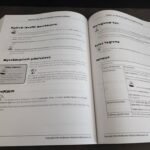Taking notes can be a valuable use of time, aiding in memory retention and better understanding of information. It allows for organization and recall, making it an effective tool for learning and productivity.
Note-taking is often seen as an essential practice in academic and professional settings. However, some argue that it is merely a waste of time. While skeptics may question the usefulness of jotting down information, research and practical experience suggest otherwise.
Far from being a futile activity, taking notes has proven benefits that can enhance learning, retention, and overall productivity. This article will delve into the reasons why note-taking is a valuable tool, exploring how it aids in memory consolidation, supports active engagement, and facilitates organization. Whether you’re a student attending lectures or a professional in a business meeting, understanding the advantages of note-taking can empower you to make the most of this practice in various contexts. So, let’s unravel the importance of note-taking and why it should not be underestimated.
Is Taking Notes A Waste Of Time : Unveiling The Truth
Is Taking Notes a Waste of Time: Unveiling the Truth
Breaking Down The Common Misconceptions
In today’s fast-paced world, where technology provides immediate access to information, the notion of taking notes may seem outdated and unnecessary. However, don’t be quick to dismiss the practice, as it is often misunderstood. Let’s break down some common misconceptions surrounding note-taking.
- Myth 1: Note-taking is time-consuming and hinders focus.
Contrary to popular belief, taking notes can actually enhance focus and improve overall comprehension. While it may require some initial effort, the act of jotting down key points helps to consolidate information and reinforce understanding. - Myth 2: Remembering everything is possible without notes.
It’s true that some individuals possess an exceptional memory, but for most of us, relying solely on our memory can be a risky endeavor. By taking notes, we create a written record of important information, ensuring we don’t miss crucial details and allowing us to reference our notes when faced with forgetfulness. - Myth 3: Digital note-taking is more effective than pen and paper.
While digital note-taking has gained popularity, the effectiveness of the method ultimately comes down to personal preference and learning style. Research suggests that writing by hand enhances memory retention and understanding, making traditional pen and paper a viable and effective option.
Exploring The Psychology Behind Note-taking
Understanding the underlying psychological mechanisms at play can shed light on why note-taking is a valuable learning strategy. When we engage in the act of writing, we activate different areas of the brain responsible for encoding and processing information. This process enhances our ability to recall information, make connections between concepts, and organize our thoughts.
Furthermore, the act of summing up information in our own words helps us to internalize and make sense of complex topics. It forces us to distill key ideas and identify the most essential details, leading to a deeper understanding of the subject matter.
Differentiating Effective Vs. Ineffective Methods
Not all note-taking methods are created equal. While some strategies can significantly improve our learning experience, others may prove to be less effective or even counterproductive. By adopting the right techniques, we can make the most of our note-taking efforts.
| Effective Methods | Ineffective Methods |
|---|---|
|
|
By adopting effective note-taking methods, we can transform the process into a valuable learning tool, enhancing our overall comprehension and retention of information.

Credit: www.amazon.com
The Purpose Of Note-taking
Note-taking serves a vital purpose in enhancing memory retention and improving learning outcomes. It is an effective strategy to organize information, reinforce understanding, and ensure active engagement, making it far from being a waste of time.
Understanding the objectives of taking notes is essential in determining whether note-taking is a productive practice or simply a waste of time. Many individuals question the purpose and effectiveness of this age-old tradition. However, note-taking serves a crucial role in enhancing learning, comprehension, and memory retention. By organizing and summarizing key information, notes can serve as a valuable tool in capturing insights and aiding recall. In this article, we will delve into the multifaceted objectives of note-taking and shed light on its significance in the learning process.
Understanding The Objectives Of Taking Notes
Note-taking is not merely jotting down words on a piece of paper; it serves a more profound purpose. Let us explore the various objectives that this practice strives to achieve:
- Facilitating Active Engagement: Taking notes during lectures, workshops, or meetings fosters active engagement. It compels us to pay closer attention to the speaker or presenter, ensuring we do not miss important points or details. This active participation enhances our focus and overall comprehension.
- Promoting Organization: Note-taking facilitates the organization of information. By structuring concepts, ideas, and examples into coherent notes, we create an orderly framework that allows us to grasp complex topics more effectively. This organized approach enables us to retrieve the information more easily when needed, enhancing our learning process.
- Enhancing Comprehension: The act of condensing information into concise notes requires us to process and understand the content in a meaningful way. By paraphrasing and summarizing key points, we actively engage with the material, leading to a deeper level of comprehension.
- Aiding Recall: Notes act as a reliable memory aid. In situations where we need to recall information, whether it be for exams or work-related tasks, our notes serve as a prompt, triggering our memory and facilitating retrieval. The act of reviewing our notes helps reinforce the content in our minds, increasing our chances of accurate recall.
- Providing a Reference Tool: Notes serve as a valuable reference tool for future use. When we encounter similar topics or revisit old material, our notes act as a reliable source of information. They provide a quick overview of the subject matter, saving us time and effort in searching for relevant information elsewhere.
Clarifying The Role Of Notes In Memory Retention
Now that we have explored the objectives of note-taking, it is important to understand the role notes play in memory retention. Contrary to popular belief, notes serve as more than just a record of information; they actively contribute to our ability to remember and recall.
When we write and review our notes, we engage in an active cognitive process that reinforces our learning. The act of encoding information into our own words increases our understanding and promotes better retention. Not only does note-taking help us remember individual facts and details, but it also aids in the building of connections and associations between different concepts.
The visual aspect of notes, such as diagrams, charts, and bullet points, enhances our memory by providing visual cues that aid in recall. By presenting information in a visually appealing format, notes become more memorable and easier to retrieve when needed.
Additionally, the act of revisiting our notes at spaced intervals, known as spaced repetition, strengthens our memory over time. By refreshing our understanding of the material periodically, we reinforce the neural pathways associated with the information, enhancing long-term retention.
In conclusion, note-taking serves multiple objectives that contribute to our learning process. From promoting active engagement to aiding memory retention, notes play a crucial role in comprehension and recall. Therefore, it is clear that note-taking is far from being a mere waste of time; it is an indispensable tool that enhances our ability to learn and remember.
Myths About Note-taking Debunked
There has been a long-standing belief that taking notes is a waste of time, hindering the learning process. However, this notion is based on a misunderstanding of the benefits and effectiveness of note-taking. In this section, we will address and debunk some common myths surrounding note-taking and shed light on its true value in the learning journey.
Addressing The Belief That Note-taking Hinders Learning
One of the prevailing myths about note-taking is that it actually hinders the learning process. Some people argue that taking notes distracts individuals from focusing on the lecture or presentation, causing them to miss out on important information. However, research suggests that this belief is unfounded.
Contrary to popular belief, note-taking enhances learning by reinforcing concepts and aiding in comprehension and retention. When we actively engage with the content we are learning—be it in a classroom setting or while reading a book—taking notes allows us to process and assimilate information more effectively. By capturing key points, summarizing ideas, and organizing our thoughts, we are able to solidify our understanding of the material.
Evaluating The Criticism Against Traditional Note-taking Practices
Another criticism often directed towards note-taking is centered around traditional pen and paper methods. Some argue that handwritten notes are inefficient compared to digital alternatives, claiming that the time spent transcribing information could be better utilized in other ways. While it’s true that technology has revolutionized the way we record and store information, it’s important to remember that different methods work for different individuals.
Traditional note-taking practices, such as writing by hand, can actually offer unique advantages. The physical act of writing stimulates cognitive processes that promote understanding and memory. Additionally, the tactile experience of pen on paper can create a stronger sensory connection to the information being written, making it easier to recall later on. Ultimately, the effectiveness of note-taking lies in finding the method that suits your learning style and allows you to absorb information most efficiently.
It is worth noting that digital note-taking tools, such as apps and software, offer convenient features like search functionality and easy organization of notes. This can be particularly beneficial for those who prefer a more streamlined approach or for individuals who work with large volumes of information. The key is to choose a method that aligns with your personal preferences and helps facilitate your learning process.
In conclusion, note-taking is far from being a waste of time. Debunking the myths surrounding note-taking allows us to recognize its true value in the learning process. Whether you prefer pen and paper or digital tools, note-taking serves as a powerful tool for comprehension, retention, and overall knowledge acquisition.
Strategies For Efficient Note-taking
Effective note-taking is a valuable skill that can significantly enhance your learning experience and productivity. By capturing important information, ideas, and insights, you create a tangible resource that helps you better understand and retain information, while also enabling you to refer back to your notes when needed. In this section, we’ll explore some strategies for efficient note-taking that will maximize the usefulness of your notes and make your learning experience more effective.
Highlighting Modern Tools And Techniques
In our fast-paced digital age, note-taking has evolved beyond traditional pen and paper. Nowadays, there is a wide range of modern tools and techniques that can enhance your note-taking process. These tools not only streamline the process but also offer features that traditional methods lack, such as the ability to easily search and organize your notes. Here are some noteworthy tools and techniques to consider:
- 1. Digital note-taking apps: Utilize popular apps like Evernote, OneNote, or Google Keep to create and organize your notes digitally. These apps allow you to sync your notes across multiple devices, ensuring you can access them anytime and anywhere.
- 2. Voice recording: If you find it challenging to jot down notes while listening to a lecture or presentation, consider using voice recording apps like Voice Memos or Audacity. You can later revisit the recordings and transcribe the important points.
- 3. Mind mapping: Explore mind mapping tools like MindMeister or XMind to visually represent ideas and concepts. Mind maps provide a visual structure that helps with understanding and recalling information.
Encouraging Practices That Maximize Note Usefulness
While utilizing modern tools can certainly enhance your note-taking process, it’s equally crucial to adopt practices that will maximize the usefulness of your notes. By implementing the following practices, you can make your notes more valuable and effective:
- 1. Actively listen and summarize: Instead of transcribing every single word, listen actively and summarize the main points in your own words. This helps you internalize the information and ensures that your notes are concise and easy to review.
- 2. Use formatting to your advantage: Make use of formatting options like bullet points, numbering, bold, italics, and headings to structure your notes. This allows you to quickly navigate and comprehend the content, especially when reviewing your notes at a later time.
- 3. Review and revise regularly: Schedule regular review sessions to revisit your notes. This helps reinforce your understanding and identify any gaps in your knowledge. It’s also a great opportunity to revise and update your notes as new information becomes available.
Remember, effective note-taking is a skill that requires practice and experimentation to find what works best for you. By incorporating modern tools and techniques, along with adopting practices that maximize note usefulness, you can transform your note-taking experience into a valuable asset for your learning and productivity.
Unveiling The Truth About Taking Notes
Taking notes during meetings, lectures, or when reading can be a controversial topic. Some argue that note-taking is a waste of time, while others swear by its benefits. In this blog post, we will uncover the truth about taking notes and provide valuable insights on its value. So, if you’ve ever wondered whether jotting down those key points is really worth it, keep reading.
Summarizing Key Insights On The Value Of Note-taking
Note-taking offers a myriad of advantages that can enhance our learning and comprehension. Despite the skepticism that surrounds this practice, several compelling reasons support its value:
- Improved comprehension: When we take notes, we actively engage with the information, which aids our understanding and retention. It forces us to process and synthesize the content, leading to better comprehension in the long run.
- Enhanced memory: Studies have shown that the act of writing can improve memory recall. By jotting down important points, we create visual and tactile cues that make it easier to remember, allowing us to recall the information more effectively.
- Organization and structure: Taking notes provides a structure to the information we consume, making it easier to refer back to later. It allows us to organize our thoughts, categorize key ideas, and create a comprehensive summary for future reference.
- Active participation: Instead of passively absorbing information, note-taking encourages active participation. It keeps us engaged in the conversation or lecture, stimulating our critical thinking and enabling us to ask insightful questions or contribute to the discussion.
- Personalization: Notes offer a personalized record of information that can be tailored to our specific needs and learning style. We can highlight significant details, underline key concepts, or add personal insights, making the content more accessible and meaningful to us.
Providing Actionable Tips To Make Note-taking Worthwhile
While note-taking can be a valuable tool, making it truly worthwhile requires adopting effective strategies. Here are some actionable tips to enhance your note-taking experience:
- Active listening: Pay close attention to the speaker or lecturer, focusing on the main ideas and key points. Actively listen for cues that indicate important information, such as emphasis on certain words, repetition, or the use of visual aids.
- Use shorthand and symbols: Develop your own system of shorthand and symbols to abbreviate common words and concepts. This allows for faster note-taking without sacrificing important information. Experiment with different techniques to find what works best for you.
- Structure your notes: Organize your notes using headings, subheadings, bullet points, or numbered lists. This visual structure helps you see the relationships between ideas and makes it easier to review and revise your notes later.
- Review and revise: Regularly review and revise your notes to reinforce your understanding and consolidate your knowledge. Add any additional insights or thoughts that may have occurred to you since the initial note-taking session.
- Digitize and backup: Consider digitizing your notes for easy accessibility and backup. Use note-taking apps or software that allow you to search, tag, and organize your digital notes efficiently. This way, you’ll always have your notes at hand, even if you misplace your physical notebook.
Taking notes might not be everyone’s cup of tea, but when done effectively, it can significantly enhance your learning outcomes. By summarizing key insights and following actionable tips, you can make note-taking a valuable practice worth your time.
Frequently Asked Questions For Is Taking Notes A Waste Of Time
Is Taking Notes During Lectures Effective?
Yes, taking notes during lectures is highly effective as it helps in retention, improves focus, and enhances understanding of the subject matter. It allows you to capture key points, organize information, and review important concepts later, leading to better performance in exams and assignments.
What Are The Benefits Of Note-taking?
Note-taking offers several benefits, such as increased comprehension, improved memory retention, and enhanced critical thinking skills. It helps in summarizing complex information, organizing thoughts, and making connections between different concepts. Additionally, notes act as valuable study material for exams and serve as a useful reference for future learning.
How Can Note-taking Improve Learning Outcomes?
Note-taking improves learning outcomes by actively engaging your brain during the lecture, allowing you to capture important information, and reinforcing understanding through the act of writing. It promotes active listening, helps you identify key concepts, and encourages critical thinking and analysis, resulting in better comprehension and retention of the subject matter.
Should I Take Handwritten Notes Or Use A Digital Device?
Whether you choose to take handwritten notes or use a digital device depends on your personal preference. Handwritten notes have been shown to enhance memory retention and offer less distraction. On the other hand, digital note-taking allows for easy organization, editing, and searchability.
Choose the method that best suits your learning style and convenience.
Conclusion
While some may argue that taking notes is a waste of time, the benefits far outweigh the perceived drawbacks. Notes help improve memory retention, promote active listening, and enhance overall comprehension and understanding. Whether you prefer traditional pen and paper or digital note-taking, incorporating this practice into your daily routine can significantly enhance your productivity and learning.
So, embrace the power of note-taking and unlock your full potential.







